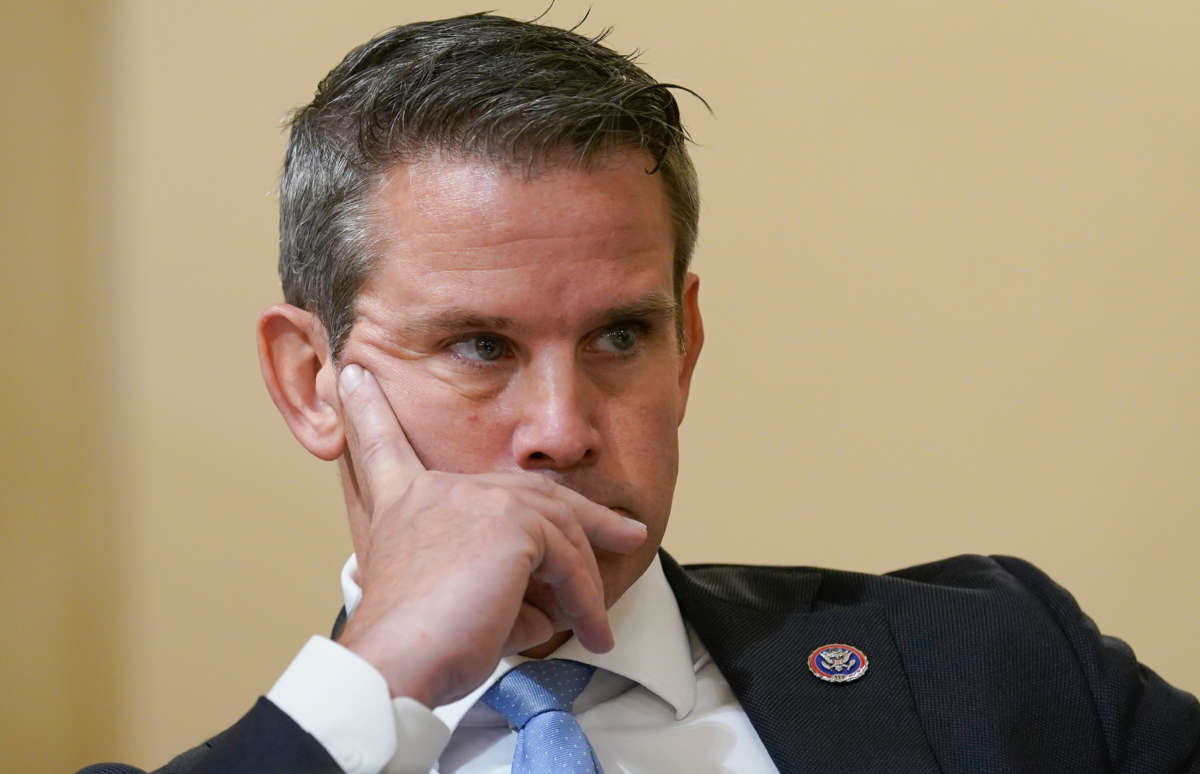Honest, paywall-free news is rare. Please support our boldly independent journalism with a donation of any size.
Donald Trump’s Big Lie about the 2020 election was once a fringe idea. It was thought up by Trump and his team to throw the election into chaos and, he hoped, keep Trump in power, no matter the election results.
Republicans in Congress didn’t have to follow suit, but they did and have been repeating the lies about the election for months. Even after their lives were put in danger on January 6 by an angry mob of Trump hooligans, 147 of them voted to overturn the election results. Republicans at the state level, meanwhile, have now passed 30 laws to restrict voting based on the lies about “voter fraud.”
This is all despite the fact that, evidently, Republican lawmakers don’t even believe in the Big Lie. Rep. Adam Kinzinger (R-Illinois) said on CNN on Wednesday that nearly all of his colleagues in Congress don’t actually believe that there was widespread voter fraud in the 2020 election — but they repeat the lie anyway.
“Save one or two maybe out here, nobody — and I think it’s very important to repeat — nobody actually believes the election was stolen from Donald Trump, but a lot of them are happy to go out and say it was,” Kinzinger told Wolf Blitzer.
Kinzinger, one of the two Republicans on the House committee to investigate January 6, also said that Republican colleagues are quietly supportive of his work on the committee. “There is a lot of people, you know, that come up and say it. And it’s not any of them that go on TV and spout the Big Lie and then say it. It’s the ones that stay more quiet that I think appreciate the stand,” he said. “But it’s a lot.”
Most observers would have a hard time believing that Republicans who don’t stand behind the Big Lie are actually the silent majority in Congress. GOP members have been repeating the lie for months and have even convinced their voter base that the election was stolen, even if they claim in private that they don’t believe it themselves. They had even voted to oust the other Republican on the January 6 committee, Rep. Liz Cheney (R-Wyoming), from party leadership back in May for not repeating Trump’s lie.
Kinzinger and Cheney aren’t angels. They are, as William Pitt recently wrote for Truthout, “hardcore House Republicans” that count as moderates only because they reject the Big Lie — a very low bar. “At first blush, the inclusion of Cheney and Kinzinger would seem to represent a giant step back” because of their heinous views on LGBTQ rights, health care and the forever wars in the Middle East, Pitt wrote.
But the party as a whole has become so extreme that the two seem like middle-of-the-road legislators. The drama stirred by the party over the January 6 committee did even more to exaggerate that stance.
House Minority Leader Kevin McCarthy (R-California) had raised a stink over House Speaker Nancy Pelosi’s (D-California) rejection of his picks, Representatives Jim Jordan (R-Ohio) and Jim Banks (R-Indiana), from the January 6 committee. He called the process a “sham” and said that the Republican Party would not take part, making it seem as though the entire caucus was opposed to the process.
As Kinzinger has said, however, this is clearly not the case. Though many Trump-allied Republicans downplay the attack today, it would appear that many of them are still alarmed about the severity of the attack, even if they won’t admit it.
Rep. Andrew Clyde (R-Georgia), for instance, has referred to the attack as a “normal tourist visit,” a comparison that he still stands by today. But photos from the day show him and fellow lawmakers barricading the door of the House chamber, suggesting that even he believed it was anything but normal six months ago.
Rep. Mo Brooks (R-Alabama), who had told the Trump mob to “start taking down names and kicking ass” before they attacked the Capitol, recently admitted to Slate that he was warned of the risks of the day and wore body armor to protect himself. Still, he thinks that the January 6 committee isn’t necessary and the conservative attack to reinstate Trump as president despite the will of over 81 million voters would be somehow more politicized than it already has been because of the hearings.
A terrifying moment. We appeal for your support.
In the last weeks, we have witnessed an authoritarian assault on communities in Minnesota and across the nation.
The need for truthful, grassroots reporting is urgent at this cataclysmic historical moment. Yet, Trump-aligned billionaires and other allies have taken over many legacy media outlets — the culmination of a decades-long campaign to place control of the narrative into the hands of the political right.
We refuse to let Trump’s blatant propaganda machine go unchecked. Untethered to corporate ownership or advertisers, Truthout remains fearless in our reporting and our determination to use journalism as a tool for justice.
But we need your help just to fund our basic expenses. Over 80 percent of Truthout’s funding comes from small individual donations from our community of readers, and over a third of our total budget is supported by recurring monthly donors.
Truthout has launched a fundraiser to add 500 new monthly donors in the next 10 days. Whether you can make a small monthly donation or a larger one-time gift, Truthout only works with your support.
